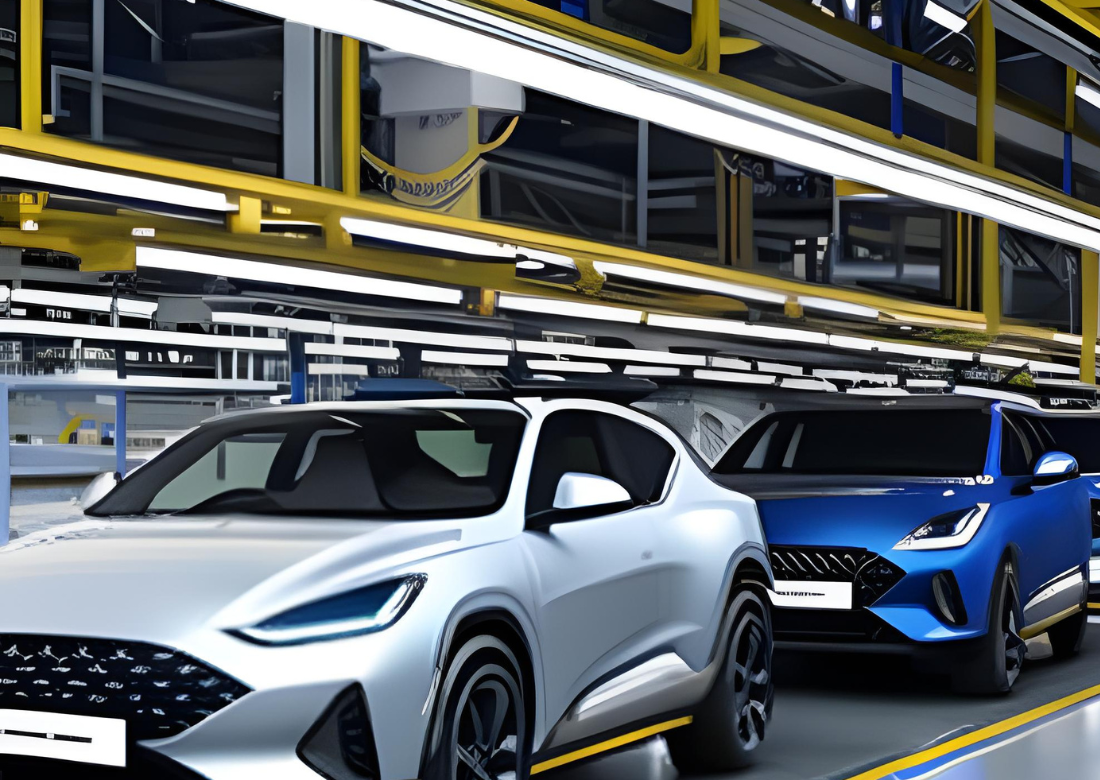Table of Contents
- 1 Unleashing Creativity in Design
- 2 Precision Engineering and Production
- 3 Enhancing Supply Chain Efficiency
- 4 Quality Control Like Never Before
- 5 Advancing Driver-Assistance Systems
- 6 The Road Ahead – Revolutionizing Vehicle Manufacturing
- 7 Transformative Example: Tesla’s Revolution in Vehicle Manufacturing
- 8 FAQs About AI Revolutionizing Vehicle Manufacturing
Revolutionizing Vehicle Manufacturing Processes Through AI Integration. In the fast-evolving landscape of vehicle manufacturing, the integration of Artificial Intelligence (AI) has emerged as a transformative force, redefining the industry’s processes and propelling it into a new era of efficiency, precision, and innovation. Revolutionizing Vehicle Manufacturing. This article delves deep into how AI is reshaping every facet of vehicle manufacturing, from design and production to quality control and beyond.
Unleashing Creativity in Design
AI is breathing new life into the creative aspect of vehicle manufacturing. Through advanced algorithms and machine learning models, designers now have the ability to explore a myriad of design possibilities that were once limited by human capacity and time constraints. Revolutionizing Vehicle Manufacturing. This creative freedom is harnessed by AI-driven design tools that generate and evaluate countless design iterations, considering factors such as aerodynamics, aesthetics, and functionality.
Precision Engineering and Production
The integration of AI has ushered in a new era of precision engineering and production in the automotive sector. Manufacturing processes have become more streamlined, with AI-powered robots and automated systems performing intricate tasks with unparalleled accuracy. This not only reduces the risk of errors but also enhances the overall production speed, contributing to shorter lead times and increased productivity. Revolutionizing Vehicle Manufacturing.
Enhancing Supply Chain Efficiency
Revolutionizing Vehicle Manufacturing. AI’s influence extends beyond the factory floor, permeating into the supply chain management. Revolutionizing Vehicle Manufacturing. By analyzing historical data, demand forecasts, and market trends, AI algorithms optimize inventory levels, minimize supply chain disruptions, and facilitate “just-in-time” delivery systems. This results in cost savings, reduced waste, and improved responsiveness to market fluctuations.
Quality Control Like Never Before
Quality control is a paramount concern in vehicle manufacturing, and AI is revolutionizing this aspect through advanced inspection systems. Utilizing computer vision and machine learning, AI-powered cameras meticulously examine every detail of a vehicle, detecting even the slightest defects that might escape human scrutiny. Revolutionizing Vehicle Manufacturing. This enhances the final product’s quality and ensures that vehicles leaving the assembly line meet the highest standards.
Advancing Driver-Assistance Systems
AI’s impact on the automotive industry is palpable even after the manufacturing process is complete. Driver-assistance systems, which range from adaptive cruise control to lane-keeping assistance, rely heavily on AI algorithms. Revolutionizing Vehicle Manufacturing. These systems gather real-time data from sensors and cameras, enabling vehicles to make split-second decisions that enhance safety and driving experience.
The Road Ahead – Revolutionizing Vehicle Manufacturing
As AI continues to advance, the future of vehicle manufacturing holds even more promise. Predictive maintenance powered by AI can help anticipate mechanical issues before they occur, reducing downtime and maintenance costs. Revolutionizing Vehicle Manufacturing. Additionally, the concept of fully autonomous vehicle manufacturing plants, where robots collaborate seamlessly, is on the horizon.
In conclusion, the integration of AI is undeniably revolutionizing vehicle manufacturing processes. From igniting creativity in design to enhancing production efficiency and ensuring quality, AI’s impact is profound and far-reaching. The automotive industry is at the cusp of a technological transformation, and embracing AI-driven innovations will be crucial for companies striving to maintain a competitive edge in this rapidly evolving landscape. Revolutionizing Vehicle Manufacturing.
Transformative Example: Tesla’s Revolution in Vehicle Manufacturing
To comprehend the profound impact of AI in revolutionizing vehicle manufacturing, a compelling example is Tesla, a trailblazer in the automotive industry. Tesla’s integration of AI has reshaped the landscape, from design to production and beyond, setting a new standard for innovation and efficiency.
Design Beyond Conventional Bounds
Tesla’s approach to vehicle design is emblematic of AI’s transformative power. Revolutionizing Vehicle Manufacturing. Through AI algorithms and machine learning models, Tesla designers can explore an expansive array of design possibilities. These algorithms consider factors ranging from aerodynamics and aesthetics to structural integrity, enabling designers to push the boundaries of creativity while ensuring optimal performance.
Automated Precision at Scale
The production process itself showcases Tesla’s pioneering spirit in precision engineering. AI-driven robots and automated systems perform intricate tasks with remarkable precision. Revolutionizing Vehicle Manufacturing. This level of accuracy reduces the margin for errors, contributing to Tesla’s reputation for producing vehicles of exceptional quality. Automated processes also enhance production speed, which, in turn, enables quicker manufacturing cycles and delivery to customers.
Supply Chain Agility and Optimization
Tesla’s supply chain management embodies the efficiency that AI can bring. By harnessing AI’s analytical capabilities, Tesla optimizes its supply chain by predicting demand fluctuations, adjusting inventory levels accordingly, and streamlining delivery logistics. Revolutionizing Vehicle Manufacturing. This foresight not only minimizes excess inventory but also ensures that components are available when needed, resulting in cost savings and reduced waste.
Elevating Quality Control to New Heights
Revolutionizing Vehicle Manufacturing. Quality control is paramount in vehicle manufacturing, and Tesla’s utilization of AI in this arena is noteworthy. Tesla employs advanced computer vision and machine learning to meticulously inspect every aspect of its vehicles. AI-powered cameras can identify even the most minute defects that might escape human observation. As a result, Tesla can deliver vehicles of unparalleled quality and safety to its customers.
Advancements in Driver-Assistance Technology
Tesla’s vehicles are at the forefront of AI-driven driver-assistance systems. The company’s Autopilot feature relies on real-time data collected from sensors, cameras, and AI algorithms. This technology empowers Tesla vehicles to navigate and make split-second decisions, enhancing both the safety and driving experience for Tesla owners. Revolutionizing Vehicle Manufacturing.
A Glimpse into the Future – Revolutionizing Vehicle Manufacturing
Tesla’s AI integration offers a glimpse into the future of vehicle manufacturing. Revolutionizing Vehicle Manufacturing. The company’s commitment to innovation extends beyond the present, with ongoing research into predictive maintenance and the potential for fully autonomous manufacturing facilities.
Revolutionizing Vehicle Manufacturing. In essence, Tesla serves as a powerful example of how AI is revolutionizing vehicle manufacturing. By seamlessly incorporating AI into various stages of the production process, Tesla has redefined efficiency, creativity, and quality in the automotive industry. As other manufacturers follow suit, the impact of AI on the future of vehicle manufacturing promises to be truly transformative. Revolutionizing Vehicle Manufacturing.
FAQs About AI Revolutionizing Vehicle Manufacturing
1. How is AI impacting vehicle design?
AI is transforming vehicle design by leveraging advanced algorithms and machine learning models. Designers can now explore a multitude of design possibilities, enhancing creativity and considering factors like aerodynamics and aesthetics. Revolutionizing Vehicle Manufacturing.
2. What role does AI play in precision engineering?
AI integration has led to precision engineering in vehicle manufacturing. Automated systems powered by AI perform intricate tasks with accuracy, reducing errors, improving production speed, and contributing to higher overall productivity.
3. How does AI enhance supply chain management?
Revolutionizing Vehicle Manufacturing. AI optimizes supply chain efficiency by analyzing historical data, demand forecasts, and market trends. Revolutionizing Vehicle Manufacturing. This results in cost savings, reduced waste, and improved responsiveness to market fluctuations through optimized inventory levels and streamlined delivery systems.
4. How is AI transforming quality control processes?
AI is revolutionizing quality control through advanced inspection systems. Using computer vision and machine learning, AI-powered cameras meticulously examine vehicle details, detecting even minor defects that might elude human inspection. Revolutionizing Vehicle Manufacturing.
5. What impact does AI have on driver-assistance systems?
Revolutionizing Vehicle Manufacturing. AI-driven driver-assistance systems rely on real-time data from sensors and cameras to enhance safety and driving experience. Revolutionizing Vehicle Manufacturing. These systems, including adaptive cruise control and lane-keeping assistance, make split-second decisions to assist drivers on the road.

